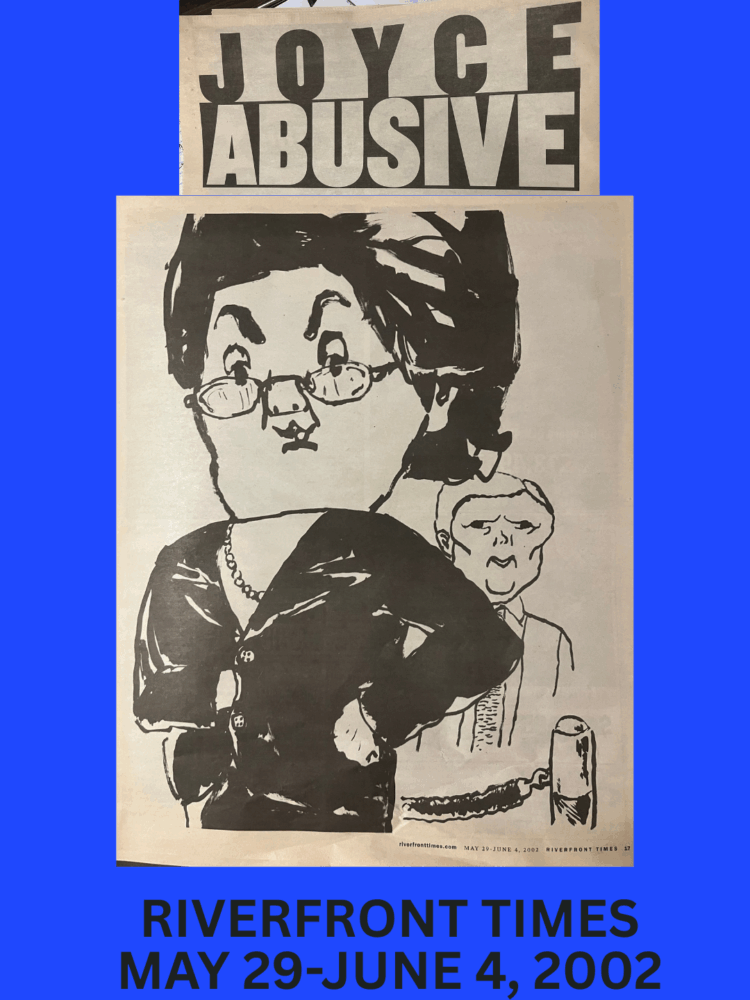Joyce Aboussie bio, part 4 of 7

John’s note: Joyce Aboussie is an iconic figure in both Democratic politics and the philanthropic world. In 2002, The Riverfront Times’ DJ Wilson authored an in-depth profile of Aboussie, published in the May 29-June 4 edition of the paper.
The Riverfront Times has since been sold, and Wilson passed away in 2019. To my knowledge, no versions of Wilson’s article remain online today. In the spirit of capturing Aboussie’s most valuable lessons – and to preserve Wilson’s detailed journalism – I’ve captured the original text of the RFT piece with occasional context added. For ease of readability, I’ve split the article up into 7 parts, using the same topic breaks originally used by Wilson in the print piece.
— John Combest
Part 1: Joyce Aboussie
Part 2: Ron Casey learns a valuable lesson
Part 3: Joyce Aboussie and Dick Gephardt, Bob Holden, Francis Slay, Jeff Rainford, Richard Callow
Article text of Part 4 begins below:
The past year has been Joyce Abusive rough for Joyce Aboussie – her mother and only brother have died, and her father is seriously ill.
At first Aboussie agreed to sit down for an in-person interview; then she said that because of travel and other personal complications, it would have to be done by phone. After a few awkward minutes on the phone, she said she had to go and could only respond if the questions were faxed to her.
Later that afternoon, she had an aide call to tell us to cancel the fax; she wouldn’t have time over the next several weeks to respond to the questions.
For a moment, set aside her personal pain. That Aboussie still declines to be interviewed is no surprise.
Real power doesn’t crave the spotlight. Real power creates the situation the spotlight follows.
“She doesn’t want to be a personality, unless it’s among a certain crowd – the political crowd,” says one longtime colleague. “If her name never appears in the newspaper, Joyce will be happy. Like everyone else in politics, her interest is in power and the application of that power for her goals. Whether she’s in the newspaper has nothing to do with it. She loves being the hidden hand.”
(John’s note: It’s impossible for me to overstate how much the above quote influenced me as a young political operative in 2002.)
In conversations with almost anyone, including the governor, she is in charge. She calls the shots; she has the info. Talking to the media leaves her words and views for someone else to pick over and present. Where’s the advantage to that? What could she gain from media attention?
Then there’s her personal style, which has been described as brusque.
Several people who say they either like or admire Aboussie also say they would never want to work for her because of the blunt way she bosses people around.
In getting her way, she doesn’t mince words. She can cuss like a taxi driver in a traffic jam. One of her nicknames is “Joyce Abusive.” She’ll go off on someone if she thinks it will be effective. That someone
could be anyone.
In the dozens of interviews conducted for this article, all but a few interviewees spoke on the condition their quotes would not be attributed to them. One public official described a phone call from Aboussie
this way:
“When she calls you up out of the blue and you say, ‘Hello, Joyce,’ and she starts to scream at you and curse at you for something that is a marginal affront – that really is more of a miscommunication than it is anything else – that can scare the shit out of somebody that has to depend on elected officials for a living. Any number of people have been subjected to the treatment. It’s one of those things where she probably forgets about it ten minutes after the conversation. That’s just the way she does business, but it’s pretty
intimidating to people.”
With that kind of treatment in response to minor slights, no one who has to do business with her wants to risk irritating her. And because most of her work is done in the dark, her reprisals are seldom revealed. That she is feared is a testament to her power.
But whether people fear or loathe her and dislike her style or tactics, Brotherton, the Democratic political consultant, says that should not affect their judgment of her work.
“You don’t have to like Barry Bonds,” he says, “to understand he’s a great baseball player.” (John’s note: in 2003, Bonds testified to a federal grand jury that he used performance enhancing drugs, but he thought they were “flaxseed oil” and a “rubbing balm.”)
Part 5: Fundraising machine and mystique
John Combest – Missouri political news headlines